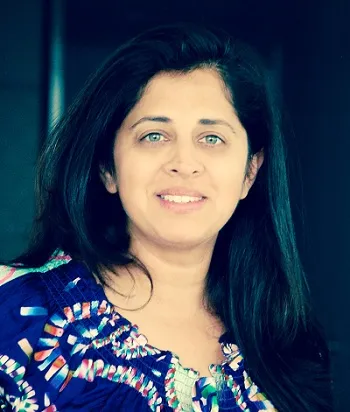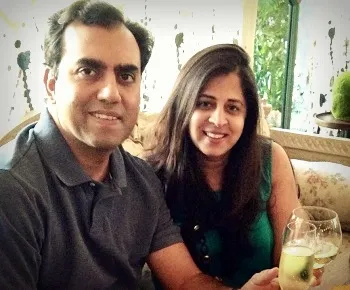Roopa Nath, the genomics geek & angel investor who set out to foster healthcare innovation

Roopa Nath holds a Ph.D in Genomics and Molecular Biology from University of Tennessee, Health Science Center, USA. She describes herself as an out and out genomics and healthcare geek. Looking at her career, you know she truly is.Dr. Roopa’s story is a perfect blend of how to pursue your dreams, stay open to changes that come along the way, make the most of the opportunities when they knock at your door, and above all have the focus to contribute to a theme much larger than yourself.
After completing her Ph.D, Dr. Roopa worked in San Francisco Bay Area biotech hotbed for a few years and eventually co-founded Actis Biologics Inc. in 2006, which is developing new therapies for cancer. Dr. Roopa helped set up India operations, licensed intellectual property from companies and Universities in USA and began the drug development process for Actis Biologics in India. She co-wrote the grant applications to fund the company’s startup costs, and secured grants worth Rs 10 crore from the Department of Biotechnology, Govt. of India. She helped start the research and development as well as clinical development efforts in Mumbai, India at Actis. Her experiences show that apart from being a geek, she is persistent in her endeavors and embodies the spirit of entrepreneurship.
Dr. Roopa is also an advisor to Mumbai Angels on healthcare investments, and heads up all technical due diligence efforts there. She has invested in Asiatic and Karmic life sciences Clinical Research Organizations with the Mumbai Angels, and is well networked in the pharmaceutical and healthcare sectors in India. She’s also an Advisor and Board observer to Karmic Life sciences. So, if you are an entrepreneur working in healthcare and wellness space, you must make it a point to connect with Dr. Roopa.
In this candid conversation, she opens up about her passion for healthcare innovation in India, and about being a woman in business.
YS: What got you excited about genomics and pursuing a Ph.D?
RN: I went to Ruparel College for my 11th and 12th classes in Mumbai. Most people in my class either pursued medicine or engineering. I didn’t like either of those. I read a book called ‘Jurassic Park’ when I was 14. This was way before the movie came out. For the benefit of your young readers, I am talking about pre-historic times (smiles). I got hooked to the concepts of DNA and cloning. These concepts were really new back then. It might sound cliched, but it was really ‘Jurassic Park’ that got me interested in life sciences. I was lucky to have studied at St. Xaviers College in Mumbai. My teachers in the Life Sciences, genetics and biochemistry departments were wonderful and the curriculum was very open-ended and experimental in nature, the exact kind of mindset that gears you towards Ph.D. In fact, I had a lot of fun during that time. I went to the US to pursue a Ph.D, which was my dream.
YS: So how was the Ph.D experience?
RN: Ph.D is a very, very hard thing to do. I worked 16 hours a day for almost six years. It requires long dedicated hours of work to get somewhere. In fact, many a times I wanted to quit because it was that hard. But soon I would come out of that momentary feeling and move ahead with determination. I should mention the influence and support my husband provided at this time, he was more persistent that I should finish my degree than I was at times, and that was really helpful.
YS: Have you always been passionate about studying?
RN: Our family is from Maharashtra. I was born in a city called Nagpur but I grew up in Mumbai. The earliest memories of my childhood are growing up near the Juhu beach and watching seagulls land on the beach in the mornings. But other than that, my earliest childhood memory is my grandfather’s library in Nagpur with over 10,000 books, mainly from the UK. I spent most of my summers in that library; I think I read all those books. Since my childhood I have always gravitated towards books. I thank my parents and grandparents for inculcating this habit in me since childhood. I guess that’s where I caught the curiosity bug.
YS: What did you do after your Ph.D?
RN: During my Ph.D I realized that academics was not my cup of tea. I wanted to work in the industry, and I joined a genomics startup. That’s when an amazing thing happened around this time, I was pregnant with my son, and took a couple of years off. It was a crazy thing to do, but I thought why not use this time to reflect upon what I wanted to pursue. In fact, now when I think back about that break, I realize it was a great time off for me.
After two years of hiatus, I wanted to get back to work. This was when I met the CEO of Actis Biologics. This was in early 2005. I told him that I would love to help him start that company in India. That is how my brush with entrepreneurship began. Putting yourself out there and being open to things and people can open up wonderful opportunities and avenues for your career growth.
YS: How was the entrepreneurial experience for an academician?
RN: I loved it. It was the most enriching experience of my life. I have learned a lot about how to set up a company from scratch. I was a one-person army, right from being a marketer to recruiter to scientist to accountant, I was doing it all. Unfortunately, my husband lived in the US so I quit active management in India at Actis and moved back to San Francisco and kept making trips to India, still being involved as a founder – albeit part time.
YS: Tell us about your angel investor avatar at Mumbai Angels.
RN: I moved full-time to India in 2010 along with my husband Sanjay Nath (Blume Ventures) who had just set up his venture fund in India. The company that I set up here in 2006 had to fold up because of Indian DCGI regulatory issues.
I was back to square one. I was wondering what next. My husband had been involved with a group called Mumbai Angels, he asked me join him for the meetings. I thought to myself, ‘what would a bio and healthcare person do at a tech investment group’s meetings?’ But I chose to embrace the uncertainty and went along just to explore.
Over time, I started analyzing the healthcare deals for Mumbai Angels. The fact that I am able to contribute by analyzing deals for Mumbai Angels and understand the early stage healthcare innovation in India is really inspiring for me. I had done an investment for them called YogaSmoga, which has done really well for them. I never thought I would enjoy investing, but I really am enjoying it. I look forward to back entrepreneurial ventures where I can add value; spaces like healthcare, wellness and fitness get me really excited.
YS: Tell us about your relationship with your husband, Sanjay Nath.

RN: I am very lucky to have him. I must mention the influence my husband had on me since the beginning. He has always been very entrepreneurial. In fact, he started his first company at 21 right out of BITS, Pilani. We had been dating for six years before I finished my Ph.D and then we got married.I think women should marry right. Marriage is about companionship and true partnership. During my Ph.D, sometimes when I was low or when I wanted to quit, my husband never let me quit, he pushed me to go ahead. I know friends whose husbands don’t want them to do Ph.D because they think women who are more educated than men might threaten them. That is a very old school of thought. However, there are progressive men too and I respect them a lot. Luckily for me, my husband is a very progressive man. I strongly believe that behind every successful woman there is a supportive man. I urge all HerStory readers to think about what qualities they would like in their partner and marry right. I am also lucky to have very supportive in-laws.
YS: Drawing from your experience, share with us some observations about women in the business world?
RN: Women are much better at multi-tasking than men. Women are extremely good at execution. In fact, just look at all the women-led companies, and you would know for yourself. Women also maintain a work life balance and companies employing women must be sensitive to this fact. Research has shown that women who have supportive employers are very productive even if they are not putting in as many hours as their co-workers. We all know that it’s not the number of hours but the quality of work that matters and who better than a woman to gauge that!
I think women should be more confident in their own abilities. It is understandable for some women to feel insecure because we grew up in a very patriarchal environment. Women who are opinionated or women who have strong focus on career are not seen favourably by many men here in India. It will take a couple of generations for it to go away, but it will surely go away, and it should.
Women need to trust each other more, which we find a little difficult to do. Men trust each other easily I think.
If women want to take a break after having a baby and stay at home, then they should do it. Similarly, men should also feel free to take a paternity break. In fact, breaks are the best way to re-invent oneself. I have seen many successful entrepreneurial stories emerge out of breaks. There are companies in the US that allow longer maternity and paternity leaves, companies in India should also look at this, some are already doing it, but we have a long way to go. Breaks are good for both men and women; it provides an opportunity to rejuvenate and reinvent oneself.
YS: What excites you most about your role today?
RN: I would like to encourage healthcare innovation in India. India is sitting on a healthcare time bomb. We are going through a major lifestyle shift. There are a lot of diseases that are catching up with people at younger ages than ever before. We do not have enough resources to cope with this change in India. What is the point of building a multi-dollar tech company when we don’t have clean water to drink? I have nothing against consumer tech, but there are other areas that entrepreneurs must pay attention to. My personal money only goes into companies in healthcare, wellness and energy. I hope our kids enjoy a much better and secure future than we do. I am really happy that I get to contribute to healthcare innovation and create an impact in some way by supporting great entrepreneurs.







